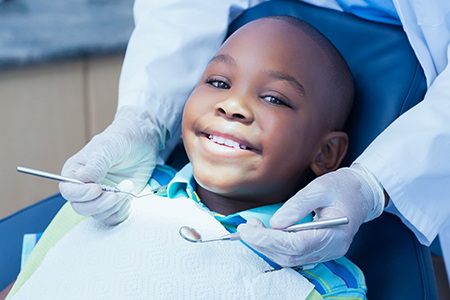At Cruzin' Dental, our pediatric program is built around one goal: to help children grow confident, healthy smiles that last a lifetime. We blend clinical expertise with a warm, child-centered approach so families feel supported from their child's first exam through adolescence. Our team focuses on prevention, education, and gentle care to reduce anxiety and make dental visits a positive part of your child's routine.
Starting Strong: Early Habits That Shape a Lifetime of Oral Health
Healthy dental habits begin long before permanent teeth arrive. We encourage parents to begin simple oral care routines as soon as the first teeth appear and to schedule a child's initial dental visit around the first birthday or when the first tooth erupts. Early appointments are brief and focused on familiarizing your child with the office environment, introducing gentle oral hygiene strategies, and answering questions about feeding, pacifiers, and teething.
Prevention is the foundation of pediatric dentistry. Regular checkups let us identify developing issues early, apply protective measures like fluoride treatments or sealants when appropriate, and tailor guidance for each stage of growth. By catching small problems before they escalate, we reduce the chance of pain, missed school days, and more invasive procedures later on.
Equally important is the way we communicate with families. Our team uses age-appropriate explanations, demonstrations, and positive reinforcement to help children understand why brushing, flossing, and healthy snacking matter. This kind of supportive education helps kids feel in control of their oral health and makes it easier for parents to maintain consistent routines at home.
Why Consistent Exams Keep Smiles on Track
Regular dental visits are more than cleanings; they are checkpoints for growth and development. During each exam, our clinicians review your child's medical and dental history, examine teeth and gums, and evaluate bite and jaw function. These routine assessments help us track eruption patterns and detect early signs of decay or alignment problems that can be easier to address when found promptly.
When necessary, we use up-to-date digital radiography to look beneath the surface—this provides a clear picture of tooth development and jaw health while minimizing exposure. Professional cleanings remove plaque and buildup from areas hard to reach at home, and we pair these treatments with practical tips so children can maintain their progress between visits.
Most children benefit from biannual checkups, but we tailor frequency to each child’s needs. Those with higher risk of decay or special dental circumstances may require closer monitoring. Our goal is to create a personalized schedule that supports steady, healthy development.
Understanding Early Childhood Decay and How to Prevent It
Tooth decay is a preventable condition that can affect very young children. Repeated exposure to sugar—especially from bottles or sippy cups left overnight—creates an environment where bacteria thrive and damage can progress quickly. Simple changes, such as replacing sugary drinks with water and cleaning gums and new teeth after feedings, can dramatically lower risk.
We emphasize practical strategies parents can use right away: limit frequent snacking on sticky sweets, encourage water between meals, and supervise brushing with a smear of fluoride toothpaste as recommended for your child's age. For older children, professional sealants help protect the biting surfaces of permanent molars where cavities often begin.
Education about feeding patterns, oral habits, and early warning signs of decay empowers caregivers to act before problems worsen. When decay is detected, our team focuses on efficient, minimally invasive solutions that restore health while keeping the experience as comfortable as possible for the child.
Simple, Everyday Steps Families Can Use
-
Choose a trusted dental partner early in your child’s life and keep regular appointments.
-
Keep baby teeth and toddler teeth clean with gentle wiping and age-appropriate brushing.
-
Avoid letting children sleep with bottles containing milk or juice; water is the safest option.
-
Bring your child in for routine exams and professional cleanings as recommended.
-
Set a consistent brushing and flossing routine and model good habits for your kids.
-
Choose nutritious snacks, limit sugary drinks, and prioritize water to protect enamel.
-
Support the transition away from pacifiers and thumb-sucking with positive encouragement at the right developmental time.
-
Use a properly fitted mouthguard for contact or high-impact sports to prevent injury.
Infant and Toddler Care: Milestones, Teething, and First Visits
From the first tooth to the toddler years, children's mouths go through rapid change. Teething can be uncomfortable, and caregivers often have questions about soothing techniques and safe remedies. Simple, effective measures such as chilled teething rings and gentle gum massage can ease discomfort, and our team is always available to advise when extra support is needed.
The first dental visit is an opportunity to guide parents on oral hygiene, nutrition, and what to expect as teeth emerge. We demonstrate proper brushing for infants and toddlers and discuss when and how to introduce fluoride toothpaste. Early guidance sets the stage for effective daily care and helps prevent common issues like early childhood caries.
Because primary teeth serve as important placeholders for permanent teeth, maintaining their health is essential. If early decay or developmental concerns arise, we recommend targeted interventions that protect future alignment and function while keeping treatment as conservative as possible.
School-Age Smiles: Prevention, Protection, and Independence
School-age children gain independence with brushing and flossing, but they still need guidance and oversight. This is the ideal time to reinforce daily oral care habits and introduce flossing as spaces between teeth change. We also work with families to plan preventive measures like fluoride varnishes and the placement of dental sealants once permanent molars appear.
Children who participate in organized sports benefit from custom or boil-and-bite mouthguards that shield teeth and soft tissues during play. We can evaluate a child’s activity level and recommend the most appropriate type of protection. Parents and coaches play a key role in making mouthguards part of the routine for safety.
As children approach their preteen years, we begin to monitor orthodontic development more closely. Early evaluation for alignment and bite issues allows us to coordinate care with orthodontic specialists when indicated, ensuring treatment is timed to maximize effectiveness and minimize complexity.
When Emergencies or Special Needs Require Extra Planning
Accidents, sudden toothaches, or dental infections can be distressing—especially for children. Our team is prepared to respond promptly with practical advice and timely care to address pain, stabilize injuries, and protect long-term oral health. We guide parents on immediate steps to take and follow up with appropriate in-office treatment.
We recognize that some children have special medical, developmental, or behavioral needs that affect dental care. In these situations, we collaborate with families and other healthcare providers to create customized care plans that prioritize safety and comfort. Options such as behavior guidance techniques and, when appropriate, gentle sedation are discussed to ensure each child can receive the care they need.
Our approach emphasizes clear communication, thoughtful preparation, and a compassionate environment. By anticipating challenges and planning ahead, we reduce stress for both children and caregivers while delivering effective clinical care.
Our Role as Your Child’s Dental Partner
We see our role as a long-term partner in every child's oral health journey. That means not only treating problems when they arise, but also helping families make informed choices at each stage of development. We tailor recommendations to a child’s age, risk factors, and temperament, and we prioritize minimally invasive treatments that preserve healthy tooth structure whenever possible.
Families appreciate a proactive, educational approach: practical coaching on home care, guidance about nutrition and habits, and clear explanations of any treatments we recommend. Our team stays current with pediatric dental best practices and technologies so we can offer safe, effective care that fits each family’s needs.
To learn more about pediatric services or to discuss an upcoming visit, please contact our office. Our team is happy to answer questions and help you plan the right course of care for your child.







